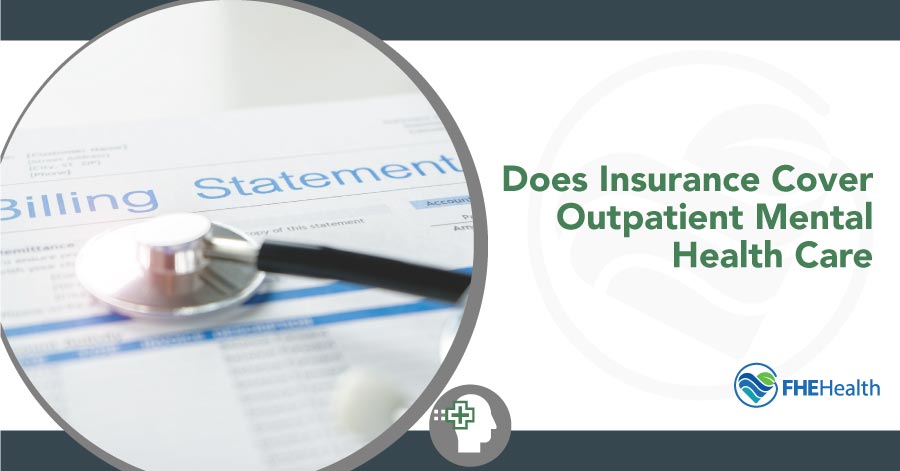
Outpatient treatment provides convenient access to mental health and addiction treatment services without the inconvenience of overnight stays and the added expenses of round-the-clock care. Even though the cost tends to be much less for outpatient care, it can still be difficult to cover the expense out of pocket without outpatient mental health insurance.
Looking for outpatient treatment is already a stressful time, and worrying about how you’ll pay only makes it worse. To alleviate this, it helps to know where to look for financial help. This guide will help you explore the types of outpatient care and how to locate insurance that covers outpatient mental health and insurance that covers therapy.
Types of Outpatient Care
Also referred to as ambulatory care, outpatient treatment is any form of medical treatment that doesn’t require hospitalization. This includes regular visits to a physician, routine health checks and any procedures where the patient returns home the same day they arrived. Outpatient mental health treatment varies depending on an individual’s needs, and the type of care provided depends on the nature and how severe a person’s condition is. At FHE Health, we offer two types of outpatient care: partial hospitalization programs and intensive outpatient programs.
Partial Hospitalization Programs
Partial hospitalization programs (PHP) are structured day programs that integrate the demands of inpatient treatment in an outpatient environment. Typically, patients spend approximately eight hours a day, five days a week, engaged in recovery activities. These activities may include but aren’t limited to comprehensive evaluation, acceptance commitment therapy (ACT), cognitive behavioral therapy (CBT), group meetings, individual therapy and case management. In PHP, patients still see their loved ones and must hold themselves accountable for their actions when they return home each night and on the weekends.
PHP usually lasts around 15 days and must be completed consecutively except for days off on the weekend. This type of treatment may be difficult for someone who goes to school full-time or who has employment obligations.
Once the treatment is complete, an individual is transitioned back into their normal lives and schedules. Usually, a patient must continue treatment with an established mental health provided through regular checks and meetings. In some cases, group support meetings are recommended. Outpatient treatment is often recommended over inpatient treatment due to costs.
Intensive Outpatient Programs
Intensive outpatient programs (IOP) can be used for most conditions that don’t require detox or 24/7 supervision, including depression, eating disorders, addiction and anxiety. Patients usually meet for five hours a day, three days a week, or three days a week for five hours a day. These programs are usually available both in the morning and in the evening, which offers greater flexibility in scheduling for individuals with other obligations. IOP is sometimes used when a person has graduated from inpatient treatment and still requires extra help transitioning back into a normal routine.
Treatment in IOP often involves the same types of therapies used in PHP, including ACT and CBT. It may also include group therapy and individual therapy sessions.
What Kind of Outpatient Treatment Does Standard Insurance Cover?
The amount of mental health insurance coverage for outpatient treatment varies depending on the individual plan. In most cases, insurance covers part, if not all, of the cost of outpatient treatment; however, your policy may limit the number of days or sessions. Some mental health coverage also may not cover certain types of programs — for example, holistic treatments, exercise programs and alternative forms of therapy.
For individuals who have government insurance plans, a number of outpatient services are covered. Medicare Part B, which is the medical insurance coverage, helps pay for things like yearly depression screenings, individual and group psychotherapy, family counseling and a psychiatric evaluation. Other services Medicare covers include:
- Medication management
- Prescription medications
- Diagnostic testing
- Partial hospitalization
- Yearly physical exams
- Treatment of substance abuse
Understanding Outpatient Mental Health Insurance
If you have any question about what type of treatment your insurance company covers, the best thing to do is simply call and ask the company. You can also sign into your online account and look through your Summary of Benefits and Coverage. Most policies cover any treatment that’s medically necessary, including mental health treatment. This would generally mean that a mental health diagnosis from a physician is enough to ensure claims are paid. It’s also important to check to see if the facility or physician is on the list of doctors who accept your type of insurance.
If your insurance is provided by a company with 50 or more full-time employees, it’s required by law to provide health insurance. While this coverage doesn’t require mental health coverage, most large corporations provide policies that include some type of mental health services.
Insurance plans that are purchased through the Health Insurance Marketplace are required to cover 10 essential health benefits. These include mental health and substance abuse services. If you need to contact your insurance company to see what’s covered, some vital questions you can ask include:
- Are there any types of medications or mental health treatments that aren’t covered?
- Is there a deductible for this service, and how much of the bill will I be responsible for?
- Is there a limit to the duration of treatment?
- What local facilities are in my network of coverage?
Remain Positive in Your Pursuit of Help
If you’ve been dealing with mental health issues, it’s often difficult to see a brighter future, but it’s possible with help. By accessing support from a trained mental health professional who can help you sort through your issues, you can get a better understanding of how to move forward and achieve a better quality of life.
At FHE Health, we offer cutting-edge substance abuse and mental health treatment. Explore your outpatient options by contacting us today at (833) 596-3502. Our team of trained and caring counselors can answer any questions you might have 24/7. Call us to get started.






